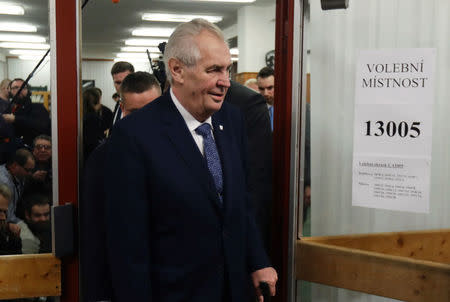Eastward-looking Zeman is favourite as Czechs vote for president

By Jason Hovet and Robert Muller
PRAGUE (Reuters) - Czechs voted on Friday in the first round of a presidential election in which eight candidates sought to topple incumbent Milos Zeman, whose brash style and leanings toward Russia and China have polarised the nation.
The vote, likely to end in a run-off in two weeks, is seen as a referendum on the 73-year-old Zeman, in office since 2013, who has harshly criticised migration to Europe from Muslim countries and is keen to deepen relations with Moscow and Beijing.
Czech presidents have limited executive powers but previous incumbents have exerted strong influence on public opinion. They also appoint central bankers and judges and are pivotal in forming governments, a process the Czech Republic - a member of both the European Union and NATO - is now going through.
A loss for Zeman to any of his main challengers could mean Czech presidency positions may shift closer to the EU mainstream, in contrast to fellow ex-communist neighbours such as Poland and Hungary whose governments have clashed with Brussels.
A former centre-left prime minister, Zeman has sought more trade with China and was the only Western leader to attend a military parade in Beijing in 2015.
He also has warm relations with Russian President Vladimir Putin and has called for the removal of EU sanctions imposed over Russia's annexation of Ukraine's Crimea region in 2014.
Zeman's policy preferences prompted protest action on Friday by a topless activist from feminist movement Femen who jumped in front of the president shouting "Zeman - Putin's slut" at a polling station where he cast his vote. The woman, who Femen said was a Ukrainian citizen, was detained by security guards.
First-round voting started at 2 p.m. (1300 GMT) on Friday and ends Saturday at the same time. Zeman, leading polls, is expected to fall short of winning over 50 percent of the vote and may face a strong challenger in a run-off on Jan. 26-27.
He is a supporter of U.S. President Donald Trump and similarly cultivates his appeal by sniping at the news media and what he calls intellectual elites. He regularly holds meetings with crowds in smaller towns.
"I like that he speaks to voters," said Irena Matuskova, a Prague nurse who planned to vote for Zeman.
MAIN CHALLENGE FROM EX-ACADEMY OF SCIENCES CHIEF
Zeman should do well in the first round due to fragmentation among opposition candidates sharing the same generally pro-EU platform. Candidates hope they can pick up rivals' support in the second round.
Zeman's most serious challenger is Jiri Drahos, 68, a chemical engineer and ex-head of the Czech Academy of Sciences.
"I would like the difference between me and Milos Zeman to be the (smallest) possible. The second round will decide and different rules will apply there," CTK news agency quoted him as saying.
The outcome may influence Czech Prime Minister Andrej Babis's chances of finally forming a cabinet as his first attempt to rule in a minority administration is likely to be rejected by parliament next week.
Zeman has backed Babis even as the billionaire businessman has struggled to get support from political parties while he battles police allegations that he illegally obtained EU subsidies a decade ago. Babis denies wrongdoing.
Babis said on Thursday he would vote for Zeman.
The two are among the most popular politicians in the country, whose 10.6 million people are widely eurosceptic and reject accepting migrants from the Middle East and Africa.
Zeman has been the most outspoken on migration, linking Muslim immigration to security threats, and he reiterated his views in a television appearance on Thursday.
"What I would be afraid of is infiltration by jihadists, and thus a higher number of terrorist attacks in European countries or cities," he said on TV Barrandov.
(Reporting by Jason Hovet, Robert Muller,; Petra Vodstrcilova and Jan Lopatka; Editing by Mark Heinrich)

